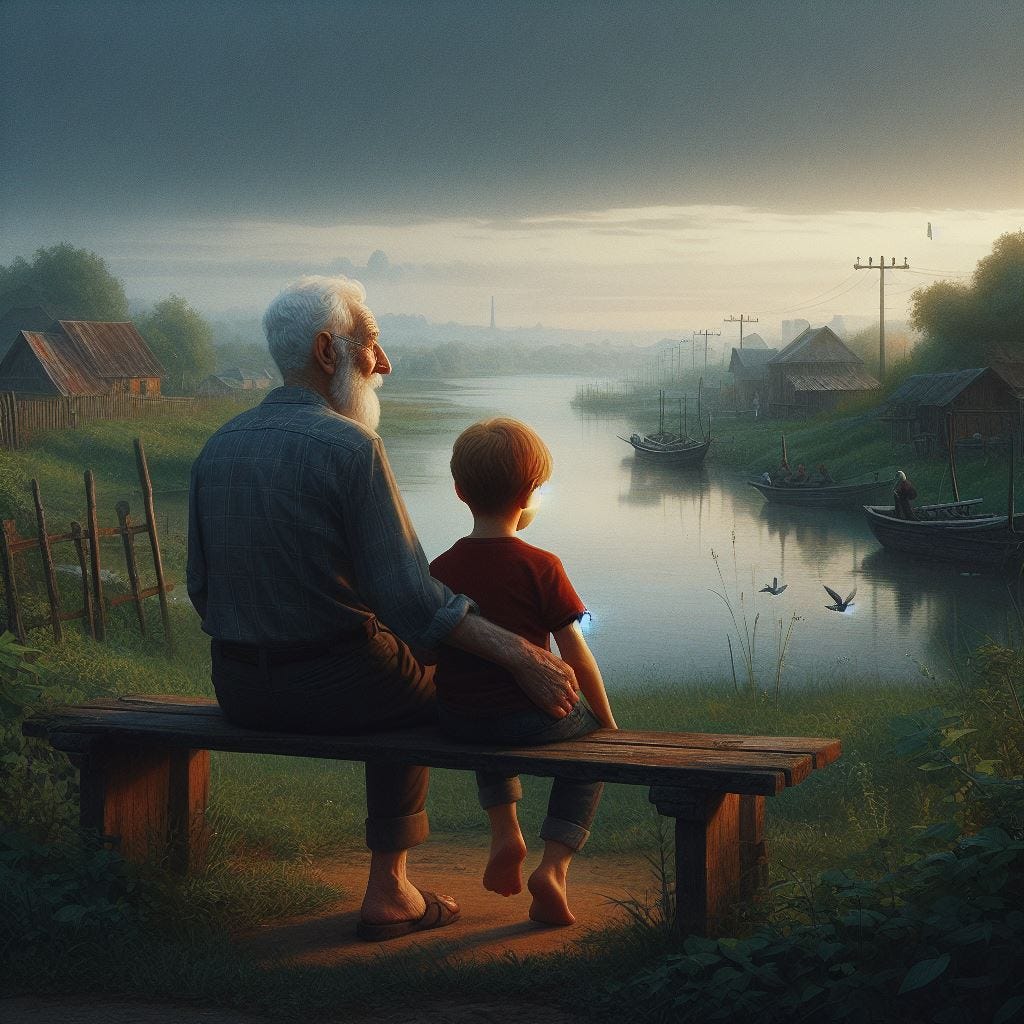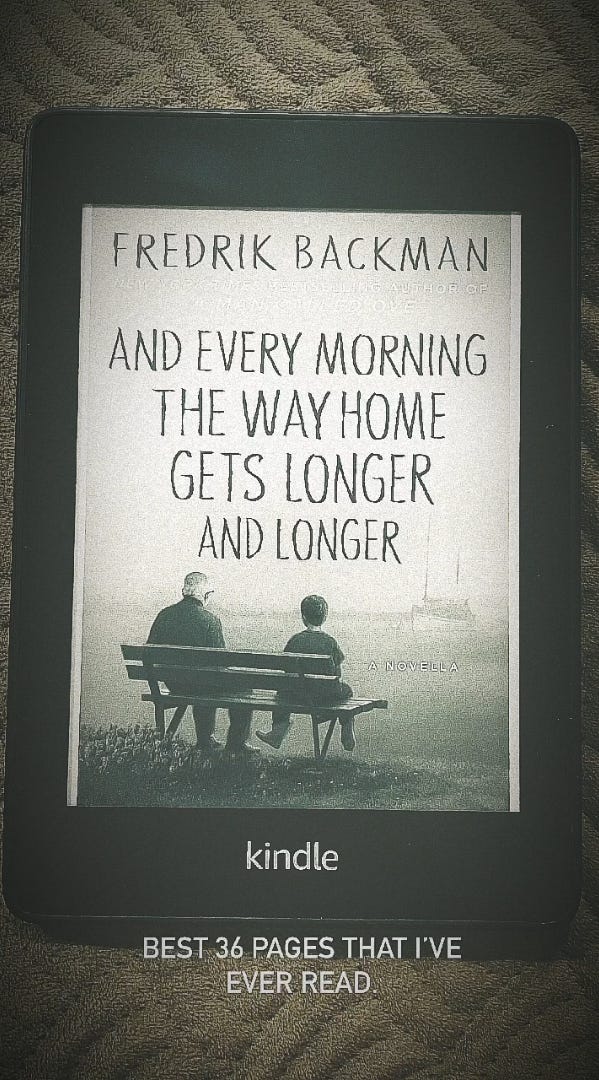1/4 The Shrinking Surface Area of Memory
“I’m constantly reading a book with a missing page, and it’s always the most important one”
This month all the Stories Are Us posts will have the theme of Memories and losing them. Dementia will be central in the stories this month. This is post 1 of the 4 part series.
At 22, I am having a plethora of new experiences and meeting loads of new people. Unbeknownst to me now - I’m collecting memories to last a lifetime. But what if my lifetime outlives my memories?
It’s a haunting thought, one that I hadn’t bothered with due to my youth. That was until I read And Every Morning the Way Home Gets Longer and Longer by Fredrik Backman.
It is the story of (a) Grandpa - a Husband, and a Father, grappling with dementia. He tries to relive his memories through his conversations with Noah (Noah), his grandson.
Having read A Man Called Ove and My Grandmother Asked Me to Tell You She's Sorry I was concerned that Backman had overused the Old Person plot. But boy was I wrong! Maybe, if I technically analyzed the books, I would find some parallels (fortunately, the author of SaU isn’t a literature snob).
Backman’s writing is dreamy as usual - well executed with masterfully developed characters. You get too engrossed in the story to bother about anything else.
I have a feeling that while at the age of 42, Backman only writes about endearing senior citizens but once older he’ll be like one of the endearing grandpas from his books.
So let’s dive into the book and what I like about it!
The duo of Noah and Grandpa sit on a bench in a square patch of grass by the river. The location seems pretty normal during their first few conversations. Eventually, increasingly bizarre things start to happen, like the appearance of a dinosaur, people fading from view on the periphery of the square patch and the square shrinking with each passing conversation. The green patch was a metaphor for the ever-shrinking memory of Grandpa. Once this metaphor dawns on you, all those bizarre incidents take on beautiful meanings! This is one of the tools that allowed Backman to pack many complicated emotions into a 72-page novella.
All these metaphors made me draw up an analogy between Backman and Apple. Apple’s screen is not just glass, its Ceramic Shield and its charger isn’t just a charger - it is MagSafe. Similarly, Backman gives names and physical bodies to emotions in his book and makes abstract nouns into proper nouns. I won’t dilute your reading experience by revealing them here.
Of the 98 books I’ve read, many made me think and reevaluate myself, but only 2 books ever made me cry. The first was A Man Called Ove by Backman and the second one is our topic today, again by Backman. Connecting the dots wasn’t difficult.
It is inherently easier to stir your emotions and make you cry with a movie, which occupies 2 senses - visual and auditory. Whereas books only have a set of letters printed in black on a white page. Therefore an author who can make you cry using only his words has cracked a very pure form of art!
A director has the screen, a singer the guitar, and an orator the diction, but an author has only the least common thing from the above 3 - words! And Backman only needs his words to make you sob like a kid.
Backman includes several episodes in 72 pages and keeps the plot moving at a perfect pace for this emotional read. In his classic style, he effectively puts into words complex human feelings into a Pinterest-style quote without being cringe.
Now let us focus on the theme for this month. Let us discuss the agony of losing one’s memory through these quotes by Grandpa:
“If I forget the funeral I’ll forget why I can’t even forget her”
Every day we try to forget a little bit of the sorrow from our past; we might use the joy from our past to help us get there. However, a dementia patient grapples to prevent both sorrow and joy from vanishing. His sorrow is the measure of his joy.
There’s a line from the song Hometown;
What makes a life complete?
Roads travelled or people you meet?
Or is it just the silence of the times in between?
When you forget the things that made your life complete, it is like starting again in your twilight years.
“It's an awful thing to miss someone who's still here.”
Loneliness takes on a worse form, because the patient is lonely, both alone and in company.
Imagine, forever being in a party where you know no one.
Instagram and Pinterest preach the virtue of enjoying the company of oneself, but for these patients, the self itself is lost.
“I’m constantly reading a book with a missing page, and it’s always the most important one”
I followed this book with Atul Gawande’s Being Mortal. A book that systematically describes the gradual degradation of our physical body. In conjunction, these books took me back to the songs of Kabir on death and particularly to the Hindu philosophy of Life being a journey towards death.
Through Grandpa’s tale, we see the memories one builds along the stages of life. Along these stages, a man’s physique ascends and then starts to suffer a steady descent. Biology takes care of making it easy for the fire to burn us or for the vultures to tear us apart.
While our body makes way for death, the human mind holds on for its dear life, literally. It is an adamant force, that centuries ago made one perform rituals to attain immortality and today makes him invest in anti-ageing research.
I wonder if Dementia is God’s ploy to make this adamant human brain give in. It forces the patient to leave behind the Maya of this world.1
Song to listen to while reading the book: Cats in the Cradle (Grandpa regrets missing his son’s childhood.)
Who is this book for: Someone with a family member suffering from Dementia. Someone who has lost a grandparent they were close to. Someone who enjoys reading about human emotions eloquently expressed in a non-depressive manner. The way Backman covers sorrow has a sense of comfort to it. It is sorrowful enough to make you think about things but not too gloomy to make the reading tough.
If you liked this book, you will like: A Man Called Ove.
I don’t mean to be insensitive. On the contrary, it’s because I empathise with the condition that I’m writing these 4 articles. The last thought was just a random musing that popped up while consuming the content for this post and while observing multiple relatives of mine who suffered from dementia in their later years.







